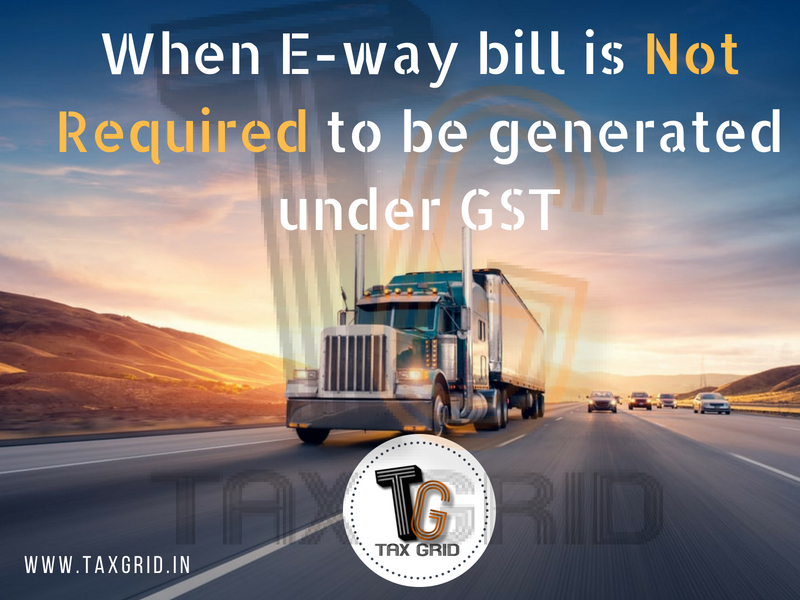When E-way bill is not required to be generated

E-way bill has been mandated by the government for inter-state/intra-state movement of goods but there are certain cases when E-way bill is not required to be generated. Such situations wherein E-way bill doesn’t apply can be found below:
When E-way bill is not required to be generated
Rule 138 (14) of Central Goods and Services Tax Rules (CGST) Rules,2017 lists the following exemptions where E-way bill is not required to be generated
- Where the goods being transported are specified in Annexure as mentioned below:
- Liquefied petroleum gas for supply to household and non-domestic exempted category (NDEC) customers
- Kerosene oil sold under PDS
- Postal baggage transported by Department of Posts
- Natural or cultured pearls and precious or semi-precious stones;
precious metals and metals clad with precious metal
(Chapter 71) - Jewellery, goldsmiths’ and silversmiths’ wares and other articles (Chapter 71)
- Currency
- Used personal and household effects
- Coral, unworked (0508) and worked coral (9601)
- where the goods are being transported by a non-motorised conveyance;
- where the goods are being transported from the customs port, airport, air cargo complex and land customs station to an inland container depot or a container freight station for clearance by Customs;
- in respect of the movement of goods within such areas as are notified under clause (d) of sub-rule (14) of rule 138 of the State or Union territory Goods and Services Tax Rules in that particular State or Union territory;
- where the goods, other than de-oiled cake, being transported, are specified in the Schedule appended to notification No. 2/2017- Central tax (Rate) dated the 28th June, 2017
- where the goods being transported are alcoholic liquor for human consumption, petroleum crude, high speed diesel, motor spirit (commonly known as petrol), natural gas or aviation turbine fuel;
- where the supply of goods being transported is treated as no supply under Schedule III of the Act;
- where the goods are being transported—
- under customs bond from an inland container depot or a container freight station to a customs port, airport, air cargo complex and land customs station, or from one customs station or customs port to another customs station or customs port, or
- under customs supervision or under customs seal;
- where the goods being transported are transit cargo from or to Nepal or Bhutan;
- where the goods being transported are exempt from tax under notification No. 7/2017-Central Tax (Rate), dated 28th June 2017 ( Exemption from CGST supplies by CSD to Unit Run Canteens and supplies by CSD / Unit Run Canteens to authorised customers notified under section 11 (1) and section 55 CSD)
- any movement of goods caused by defence formation under Ministry of defence as a consignor or consignee;
- where the consignor of goods is the Central Government, Government of any State or a local authority for transport of goods by rail;
- where empty cargo containers are being transported; and
- where the goods are being transported upto a distance of twenty kilometers from the place of the business of the consignor to a weighbridge for weighment or from the weighbridge back to the place of the business of the said consignor subject to the condition that the movement of goods is accompanied by a delivery challan
issued in accordance with rule 55. - where empty cylinders for packing of liquefied petroleum gas are being moved for reasons other than supply.
Read more about E-way Bill at TaxGrid
Subscribe to TaxGrid Newsletter


Leave a Reply